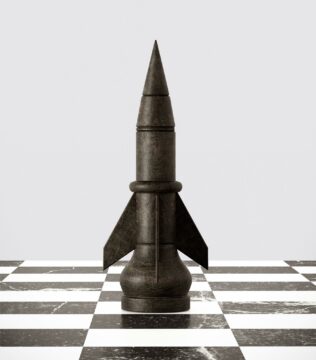William Langewiesche in the New York Times:
 The descent — in the language of nuclear war, an escalation — is shaped by grave uncertainties. How well do my enemies understand me, and how well do I understand them? Furthermore, how does my understanding of their understanding affect their understanding of me? These and similar questions stand like the endless images in opposing mirrors, but without diminishing in size. The threat they pose is immediate and real. It leaves us to grapple with the central truth of the nuclear age: The sole way for humanity to survive is to communicate clearly, to sustain that communication indefinitely and to understand how readily communications can be misunderstood. Crucial to handling the attendant distrust are fallback communications integral to the art of de-escalation — an art that has been neglected and is now dangerously foundering.
The descent — in the language of nuclear war, an escalation — is shaped by grave uncertainties. How well do my enemies understand me, and how well do I understand them? Furthermore, how does my understanding of their understanding affect their understanding of me? These and similar questions stand like the endless images in opposing mirrors, but without diminishing in size. The threat they pose is immediate and real. It leaves us to grapple with the central truth of the nuclear age: The sole way for humanity to survive is to communicate clearly, to sustain that communication indefinitely and to understand how readily communications can be misunderstood. Crucial to handling the attendant distrust are fallback communications integral to the art of de-escalation — an art that has been neglected and is now dangerously foundering.
After the Cold War, the two great powers paid less attention to the matter. Surprise attacks were their main concern, but they assumed that the existing warning systems and retaliatory capabilities were sufficient to ward off such events. At the Pentagon, ambitious officers chose some other track to advance their careers. Terrorism, cyberwarfare, even global warming — that’s where the action lay.
More here.
Enjoying the content on 3QD? Help keep us going by donating now.
